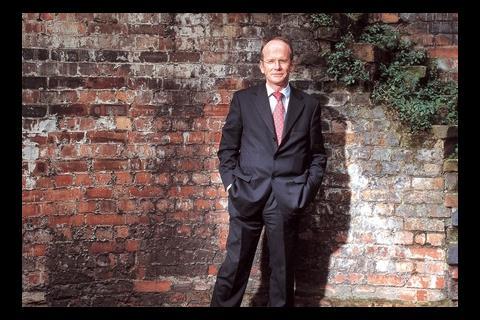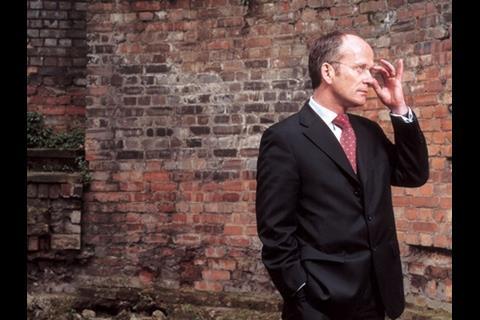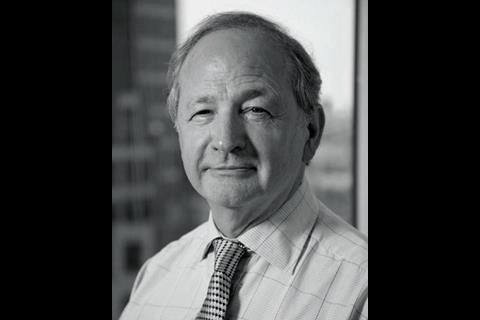You can throw what you want at the Currie & Brown chief executive â sackings, redundancies, takeover bids, irate shareholders, even a fire alarm â but heâll never agree heâs got his back up against the wall. Emily Wright meets one cool customer
âWhat have I had to defend since taking over at Currie & Brown? Well, itâs a long list isnât it?â
Euan McEwan is chief executive of a consultant that has become famed for its ups and downs, so itâs just as well that he is unfazed by the constant criticism directed at him and his company. Actually, he seems a little bored by it.
Over the past few months he has had to deal with sackings, an employment tribunal, takeover bids and delayed accounts. Although he has handled everything with minimal fuss, some might argue it has been to little effect: people remain more interested in the companyâs immediate past than its vision for the future.
McEwan is determined to set the record straight. His calm confidence is particularly impressive today given that a fire seems to have broken out in the companyâs London Wall head office where we are meeting.
After the building has been evacuated, he insists that the interview continue over the high-pitched wail of the fire alarm at the emergency assembly point â a grotty car park filled with hundreds of staff from Currie & Brown and other tenants all lined up like schoolchildren.
Standing next to a rusty old Ford Transit in his sharp navy suit, McEwan laughs and rolls his eyes at the ridiculousness of the setting before drawling: âAnything that needs answering Iâll answer. Letâs start at the beginning and Iâll clear up what I can. But one thing I will say is that I just donât understand where all this criticism is coming from. Weâre a damn good company â maybe thatâs why people feel they need to be so critical.â
The McLean years
Despite operating in 50 countries and being able to secure work on some of todayâs most prestigious projects, such as the rebuilding of the World Trade Centre in New York and the transformation of the BBCâs London estate, the 130-year-old company has suffered a number of blows over the past two years.
Many staff have left, defecting to rivals such as Davis Langdon and McBains Cooper amid rumours of internal squabbling, dissatisfied shareholders and autocratic leadership. And there have been redundancies: 11 just last December. Then there were the three directors sacked last summer for gross misconduct; and most recently, the company has delayed announcing its accounts, which were due in March, until September. This move has fuelled rumours that the figures for the year were too disappointing to release and are being topped up and smoothed out by including a more profitable six months.
Even McEwan admits he is changing the financial year to improve the figures: âI wanted to include an extra six months and go to September to September to get the best results possible,â he says.
Currie & Brown is like a little bleeding lamb. It is lost and injured in the middle of a forest with wolves coming at it from all sides
One industry source
Itâs difficult to unearth what the exact problems have been at Currie & Brown, however, many observers say the company went through a spell of bad management between 2002 and 2005 when Angus McLean was at the helm. His apparently autocratic style won him few friends, nor did his drive to turn a traditional QS and company into a higher margin management consultancy. As one critic puts it: âCurrie & Brown was not the next Deloittes and nobody wanted it to be.â One source puts the cost of attempting to change the business as high as ÂŁ1m a year, but this is not reflected in the companyâs results for those three years.
Whatever the problems, McEwan, a former director of Carillion and accountant Coopers & Lybrand, took over as chief executive in August 2005, with McLean moving to chairman. McEwan seems to have been in the faction that wanted the company to stick to QSing. He denies that this led to conflict with McLean but some sort of falling out occurred, and McLean filed for unfair dismissal, although he dropped the week that the tribunal was due to start in January.
A change of approach
McEwanâs ideas for the business were formalised in a three-year plan that emphasised client relations and proposed a restructuring of the company. This vision was supposed to placate those who had felt uncomfortable during the McLean years: âWeâve ploughed our focus back into the markets and I am really pleased and as a result we have had won ÂŁ50m worth of work.â
Among the markets McEwan has focused on are the industrial and financial sectors. He has also looked to strengthen Currie & Brownâs presence in North America, the Middle East, India and Japan.
Despite what appears to be a turnaround under his stewardship, McEwan has come in for his own share criticism. Sighing, he says: âWe can go through this all again if people need to hear it again and I will put it all to rest.â People seem to need him to do that. For one thing, there is a perception that the company is not in a strong position, and it received at least two takeover approaches last year. One industry source says: âCurrie & Brown is like a little bleeding lamb. It is lost and injured in the middle of a forest with wolves coming at it from all sides.â
McEwanâs main critics seem to be the companyâs shareholders, many of them former employees who received stakes under the partnership structure, and who complain that they are not kept abreast of decisions. After McLeanâs departure, the only board member with a shareholding is secretary David Broomer, who has an 8% stake. The implication is that he is the only person on the board who will represent shareholdersâ interests. As a result, shareholders feel they cannot keep track of their investments.
McEwan points out that it is not unusual to have few, if any, shareholders on a company board. But one angry source fumes: âIâm the first to admit that having no shareholders on the board is not that unusual, but that alone is not the issue. The problem is that the board has taken control but has failed to provide information. It is an acceptable decision to give authority to the board as long as you then have one of two situations: the presence of external shareholders who have a say, or information being effectively passed down internally. Currie & Brown has neither and so it has been left with a disenfranchised business where most people are dissatisfied.â
McEwan denies this, saying that staff are informed of the companyâs progress through monthly meetings, monthly web chats and visits to regional offices. âWe focus on staff and keeping staff happy,â he says. âWeâre giving them an annual personal development review so they know how theyâre doing.â
He also defends his decision to buy back all stakes of less than 1% and put them into the Employment Benefit Trust (EBT) of which he is a trustee. Nearly a third of the companyâs shares is now held in the trust. The accusation is that he has taken control of the largest shareholding, therefore strengthening his authority, without risking his own cash.
If all of this is the worst that anyone can come up with to say against us, then Iâm not worried at all. Watch this space. This company will become the key player in the market before long. Iâll see to that
Euan McEwan
McEwan admits that the buy back is a key plank of his strategy, and it suggests he really doesnât want much to do with the current shareholders anyway: âOne of the major things I am focusing on at this stage of the three-year plan is to get rid of all the external shareholders. I am collecting the shares back and putting them in the EBT ready to redistribute them to staff members who still work for the company, not those who have made the decision to leave. Yes, there is 30% in that trust but it is to be divvied out when I have collected more back.â
The controversies
Perhaps the biggest gripe shareholders have is the decision to withhold the latest annual results. One says: âWeâre not told anything. Itâs our money invested in the business and then suddenly the accounts arenât released. We had no idea this was going to be announced and we have no idea why it has been done.â
Huffing, McEwan responds: âWe are winning projects. Our last results were good and people can say what they want about the ones yet to be released as they are just that, yet to be released. So how can anyone comment? How do they know what they say?
Itâs a fair point, but views have been clouded by anecdotal evidence that there is a high staff turnover â for example, Davis Langdon has picked up three staff in its London office in the past six months, and McBains Cooper hired former director Geoff Seef to head its regeneration team. McEwan responds that staff leave companies all the time. It also leads him to talk about one of his concerns for the industry, the skills shortage: âWeâre always struggling to find good staff.â
It was a shame for McEwan, then, that he believed that he had to sack three of his directors, Bill Booker, Myles Cameron and Ian McCallum at the end of 2005, for alleged gross misconduct. He denies reports from the time that the reasons were as simple as his finding out that they were planning to defect to Australian rival Sinclair Knight Merz (SKM).
SKM also tried to buy Currie & Brown, opening negotiations wth âan unprofessional, amateurishâ letter according to McEwan. He adds that the other approach, from McBains Cooper, was not given a second thought as it undervalued the company. In fact, he insists that Currie & Brown is not up for sale and never has been. And on the face of it, there seems to be little reason to sell: the recent appointment of Jim OâNeill, previously a senior figure at the British Nuclear Group, to head its nuclear division demonstrates that the company can still attract top people; and its 2004/05 results showed turnover up from ÂŁ43m to ÂŁ53m and a pre-tax profit that more than doubled to ÂŁ1.2m.
Yet there remain those who think the companyâs haemorrhaging of talent is undermining it as a business. Richard Payne, a director who has since moved to the Kaupthing, Singer + Friedlander bank, says a lot of the knowledge in the company has disappeared: âMost of the original gang have left; my old friends are all gone. In just a few years hardly any of the old team are left.â
But McEwan remains unruffled. He just smiles as he starts to make his way back to the office now the fire alarm is over. âOur clients want to work with us, some have been with us for 20 years,â he says. âIf people want to criticise, they can. Maybe itâs because weâre such a good company. If they want to buy us, great. I see it as hugely flattering. But if all of this is the worst that anyone can come up with to say against us, then Iâm not worried at all. Watch this space; this company will become the key player in the market before long. Iâll see to that.â






























No comments yet